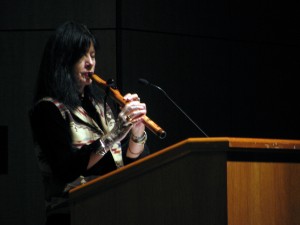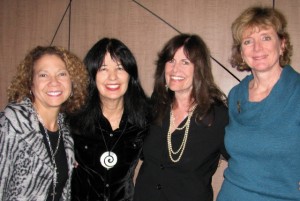
Poet Joy Harjo presented an evening of spoken word and music to students and the campus community in the Loker Student Union as part of last month’s Native American Heritage celebration. The event was presented by the IDS/PACE Alumni Club, the Multicultural Center, World Cultural Studies, and the CSU Dominguez Hills 50th Anniversary Committee with the additional generosity of donor Dr. Robert Blaine.
Gayle Elliott, lecturer of interdisciplinary studies, invited Harjo to speak at CSU Dominguez Hills.
“When I think of the ancestors from which Joy comes–the chiefs in her history whose stature is apparent still today, as well as those ancestors whose names are known only to family–I recognize the inner strength it takes to ‘hold the center’ for the birth of a song or a poem,” said Elliott.
Interdisciplinary studies major Maria E. Lopez-Duran attended Harjo’s reading, which she found reminiscent of texts read in Elliott’s Native American literature class, including Leslie Marmon Silko’s novel, “Ceremony,” in which Tayo, a Native American of mixed ancestry, returns home suffering from shell-shock after fighting against Japan in World War II.
“Joy Harjo is definitely a great ambassador of Native American culture,” wrote Lopez-Duran in a reflection after the event. “She used music and poetry to convey to the audience the sacredness of ceremonies and the connectedness to ancestors, land, water, sky, and wind. Her performance brought to memory parts of ‘Ceremony,’ where Tayo was able to receive healing through prayers, ceremonies, poems and stories.”
Harjo talked about the life experiences that shape her writings, with recurring themese that come from attending Native American boarding school, working odd jobs as a single teenage mother, and coming from a family of artists, educators, and auto mechanics.
“I don’t think I’m the bravest person,” Harjo said. “I just learn a lot.”

The poet read from several works, including “After the Rain” and “We Are Story Gatherers.” She said that many of her poems are about “moments of transformation.”
“We all have those,” Harjo pointed out. “I call the self that is inside that is wise, that always tells me the right direction, the knowing. We all have the knowing inside us, it talks, it shows you things. I could go down the rows in this room and everyone would have a story about the time their knowing told them something and they didn’t listen.”
Harjo closed with a reading of “For a Girl Becoming,” which commemorated a coming- of-age celebration for her oldest granddaughter. Elliott underscored the poem’s themes of a child born and endowed with gifts not only from her parents, but from an extended family of relatives, ancestors, and Native American culture at large.
“The really best writers I think, have an attentiveness to life, that they see some kind of sacred presence in its midst, shimmering out,” said Elliott. “And we respond to them because we recognize it too. Joy creates a path for women to walk and lets them know that, even from before their own births, they have been welcomed in the spirit world and will be loved and protected throughout life’s journey by their ancestors.”
Harjo was born in Tulsa, Ok. and is a member of the Mvskoke (Creek) Nation. Her seven books of poetry include “She Had Some Horses,” “The Woman Who Fell From the Sky,” and “How We Became Human: New and Selected Poems.” Her poetry has garnered many awards including a Lila Wallace-Reader’s Digest Award; the New Mexico Governor’s Award for Excellence in the Arts; the Lifetime Achievement Award from the Native Writers Circle of the Americas; and the William Carlos Williams Award from the Poetry Society of America.
For more information about interdisciplinary studies at CSU Dominguez Hills, click here.